Consumer Complaints Management Policy and Procedure
Consumer Complaints Management Policy and Procedure
Consumer Complaints Management Policy and Procedure
Create successful ePaper yourself
Turn your PDF publications into a flip-book with our unique Google optimized e-Paper software.
Disability Services Commission<br />
Part 2: <strong>Consumer</strong> <strong>Complaints</strong> <strong>Procedure</strong><br />
2011<br />
1. Introduction<br />
The Disability Services Commission is committed to the protection of rights of people with<br />
disability <strong>and</strong> the promotion of quality services.<br />
The Commission welcomes feedback from people with disability, their families, carers <strong>and</strong>/or<br />
advocates about any concerns they may have. Feedback enables us to correct any problems<br />
with our service, improve our relationship with our consumers <strong>and</strong> improve the overall quality of<br />
our services.<br />
The Commission encourages staff members providing direct client services to actively resolve<br />
any consumer concerns they encounter in the first instance. This approach reduces the need for<br />
people with disability, their families, carers <strong>and</strong>/or advocates to lodge a formal complaint.<br />
Staff need to be aware that, for people from Aboriginal <strong>and</strong> CaLD backgrounds, cultural <strong>and</strong><br />
language factors may affect how comfortable they feel to participate in a complaints process.<br />
Therefore additional culturally appropriate support may be required.<br />
The procedures outlined below are to assist staff to respond promptly, effectively <strong>and</strong> consistently<br />
to feedback received from people with disability, their families, carers <strong>and</strong>/or advocates.<br />
2. Complaint definition<br />
2.1 A complaint is an expression of dissatisfaction with any aspect of Commission-provided<br />
services made by people with disability, their families, carers <strong>and</strong>/or advocates that is not typical<br />
of regular communication or feedback about services. From the viewpoint of the complainant,<br />
the involvement of management staff is required to achieve a satisfactory resolution to the<br />
concern raised.<br />
2.2 A complaint is additionally classified as serious when:<br />
• it may result in a legal action – civil, criminal, or an administrative action such as a<br />
disciplinary hearing<br />
• there is an allegation of physical, sexual, or emotional abuse or neglect of a client by<br />
a Commission employee<br />
• the action of a staff member or another client may have resulted in death or serious<br />
injury of the complainant<br />
• any action taken by a staff member is outside the Public Service Guidelines, the<br />
Commission’s st<strong>and</strong>ards, code of conduct/ethics for the specific profession(s)<br />
• a complaint may have an impact on the Commission as a whole.<br />
Specific guidelines for h<strong>and</strong>ling serious complaints are outlined below in section 3.2.2.<br />
<strong>Consumer</strong> <strong>Complaints</strong> <strong>Management</strong> <strong>Policy</strong> <strong>and</strong> <strong>Procedure</strong> December 2011 6




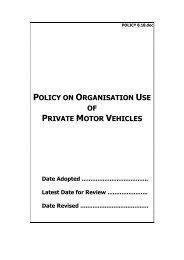


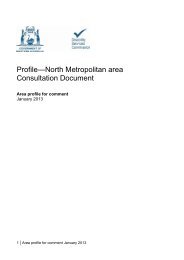
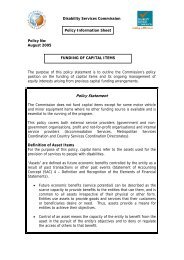
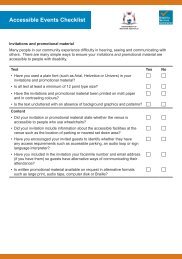
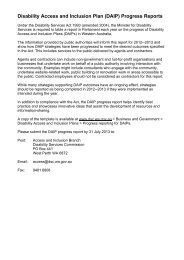
![Heerarka Adeegyada Naafada [PDF 102 kB] - Disability Services ...](https://img.yumpu.com/22096139/1/184x260/heerarka-adeegyada-naafada-pdf-102-kb-disability-services-.jpg?quality=85)



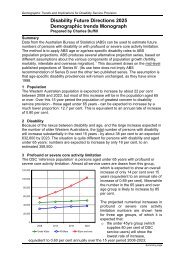
![معايير خدمات الإعاقة [PDF 297 kB] - Disability Services Commission](https://img.yumpu.com/22096120/1/184x260/-pdf-297-kb-disability-services-commission.jpg?quality=85)